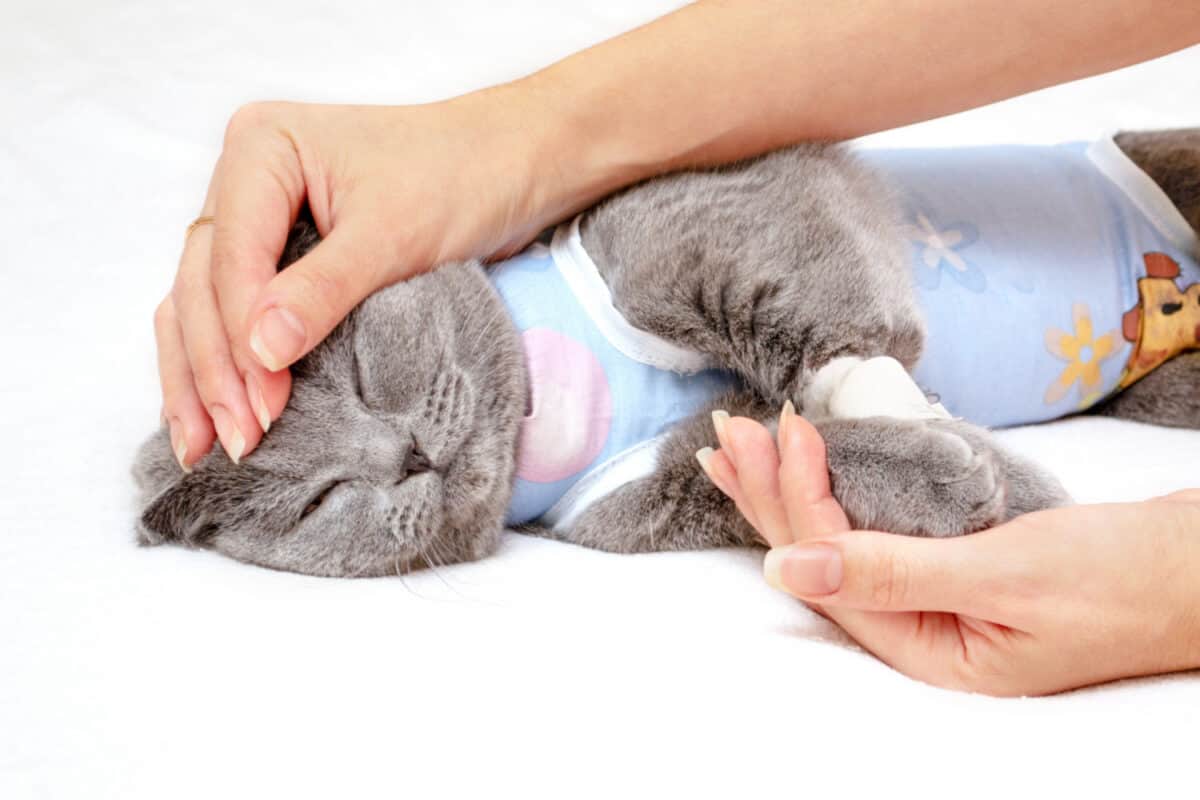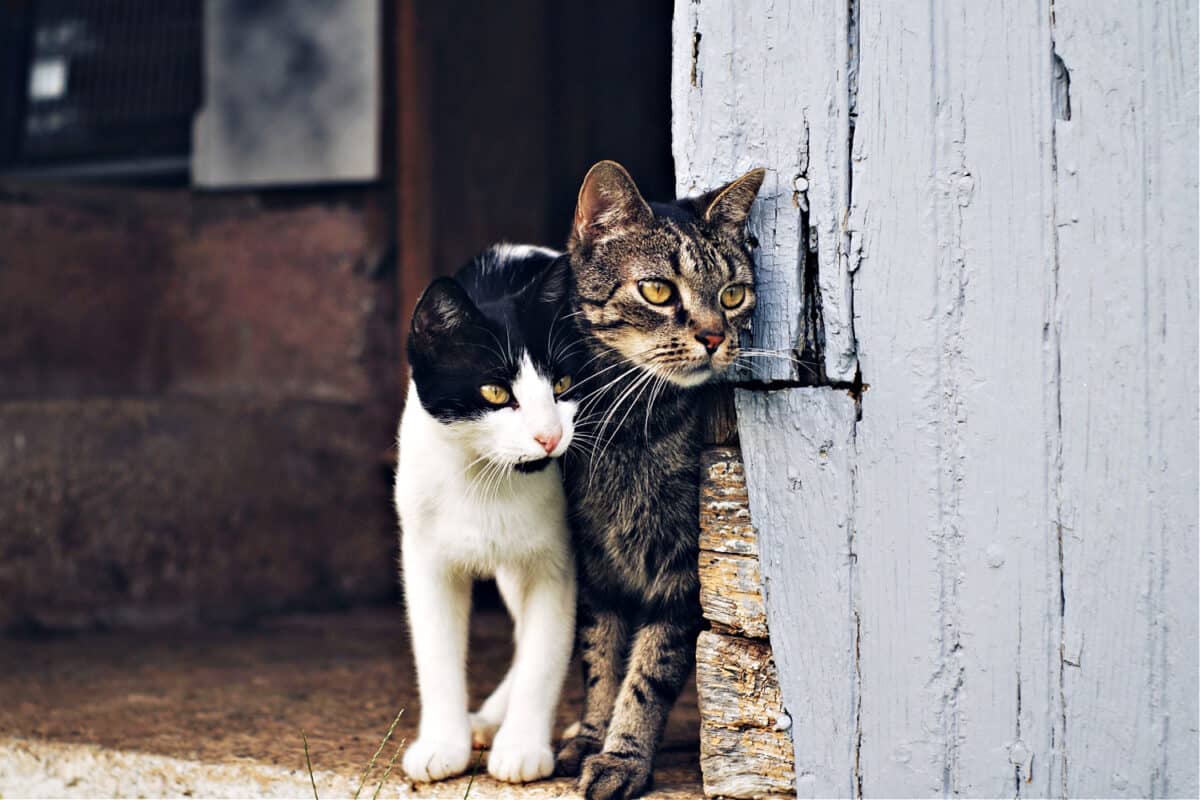Discover why it is crucial to spay and neuter your cats is crucial in our complete guide. Learn about the overpopulation crisis, the benefits of spaying and neutering, common questions, and the importance of responsible pet ownership.
Find out how these procedures are performed, when to spay or neuter your cat, and the associated costs. Help combat overpopulation and ensure the health and well-being of your cats by understanding why this procedure is essential.

Combating Overpopulation And Saving Lives
The number one problem of cats and dogs in the Western world is that of overpopulation. Each and every year, shelters throughout the country receive an estimated 8-10 million dogs and cats, according to the Humane Society of the United States.
Shelters euthanize about half of these animals due to a lack of good homes.
Ironically, these may actually be the lucky ones. Many more cats and dogs die on the streets every year with no food, medical care, or human attention.
Where do these pets come from?
They originate from homes where people allowed dogs and cats to breed indiscriminately.
As pet owners, it is our responsibility to try and reduce the scale of this tragedy. The way to do this is simple: spay/neuter our cats and dogs and urge our friends and acquaintances to do the same.
What Does It Mean To Spay Or Neuter Your Cat?
Spaying and neutering cats are probably the most common procedures in any cat clinic. Veterinarians perform both procedures while the cat is under general anesthesia.
Neutering a male cat involves making small incisions in the scrotum and removing the testes. Veterinarians do not make sutures, and they typically cover the scrotal sacs with antibiotics and allow them to heal.
Spaying a female cat is an abdominal surgery, which entails the removal of the cat's uterus and ovaries.
The Benefits Of Spaying A Female
Spaying your female cat will prevent unwanted litters. That is the fundamental issue because if your cat gives birth, you face the task of finding new homes for the kittens.
Here are some added benefits to spaying your female cat:
- Prevent tumors and infections of the ovaries and uterus.
- Greatly decrease the risk of mammary cancer.
- Spaying a cat before she goes into her first heat is best, but even spaying at a later age will dramatically decrease the risk of mammary cancer.
- Avoid the hassle of a female cat in heat.
Cats in heat can be very vocal and will attract a great many male cats. If you think you can wait out the heat cycle, you're in for a surprise. If the cat does not mate, she will keep going into heat every few weeks.

The Benefits Of Neutering A Male
The benefits of spaying a male are so significant, that it is possible to say that unaltered male cats cannot make good house pets. If you want to keep a male cat as a pet you simply must neuter him.
Here are some reasons, other than helping to fight the cat overpopulation crisis, which may convince you to neuter your male cat:
Prevent Spraying
Tomcats (unaltered males) spray foul-smelling urine around their territory. Neutering a male cat before he reaches sexual maturity, almost always prevents this behavior pattern from emerging.
If a tomcat had already taken to spraying, neutering is still likely to stop or at least significantly reduce the habit. The urine of a neutered cat is also less smelly.
Prevent Roaming
Tomcats tend to roam long distances. This means they are often away from home, sometimes for days on end. Roaming exposes these cats to danger, as they face a higher risk of being hit by cars, harmed by dogs and people, and encountering potential poisoning.
Prevent Injuries And Disease
Tomcats tend to get into catfights over females and territory. This puts them at risk of injury and increases their likelihood of contracting the disease.
By the way, this also means that it is virtually impossible to keep two or more unaltered male cats together.
SIGN UP FOR THECATSITE'S EMAIL UPDATES >

Common Questions About Spaying And Neutering
At What Age Should I Have My Cat Spayed/Neutered?
The rule is to spay/neuter before your cat reaches sexual maturity. In fact, the American Veterinary Medical Association (AVMA) now supports early spay and neutering for cats as early as 8-16 weeks of age. Consult your vet concerning your cat, but remember to have the cat altered before sexual maturity (usually before the age of 5-6 months).
Read more: When to spay or neuter a cat?
Will My Cat Get Fat And Lazy If I Spay Or Neuter Them?
Numerous studies have shown that spaying and neutering are not a cause of weight gain in cats! You can and should spay your cat without allowing her to gain weight (the same applies to male cats!).
Cats become fat if they eat too much and don't get enough exercise, not because of sterilization. Read more about overweight cats. Your cat is not likely to get lazy or sedate either.
External stimuli and genetic makeup determine the cat's personality, not its hormone glands.
Will Spay Or Neuter Stop By Kitten's Growth? I Want To Have A Large Cat.
No. Some studies indicate that early spaying/neutering actually makes the cats larger - not fat but rather taller and longer!
Will My Cat Be Deprived Of His Manliness? Or Will My Female Cat Be Deprived Of The Experience Of Motherhood?
In the world of cats, human-like sentiments concerning gender roles or experiences don't apply. Cats, unlike us, do not relate to or are influenced by societal norms of gender and its specific experiences.
A common misconception many cat owners grapple with is the idea of depriving their pets of specific gender experiences. Will neutering your male cat strip him of his "manliness?" Will a spayed female cat miss out on the joys of motherhood?
The answer is clear and simple: No. Cats don't share our human concepts of masculinity, femininity, or parenthood. These are human frameworks that don't translate to your pet's experience.
In essence, cats don't perceive these procedures as deprivation. Instead, sterilization can contribute to a healthier, longer life by preventing certain health issues. It's crucial to remember that your cat's well-being doesn't hinge on human-like experiences but on the care, love, and understanding you provide as a responsible owner.
Are There Any Risks Involved With Spaying Or Neutering Your Cat?
Like any surgery, spaying or neutering does carry a certain degree of medical risk. This could range from potential complications during the operation to post-operative recovery concerns. But it's crucial to put these risks in perspective.
When weighed against the benefits, these risks appear minimal. The positive effects of spaying and neutering on a cat's health and behavior are impressive and far-reaching. These procedures can help extend your cat's lifespan and significantly enhance their quality of life.
From reducing the risks of certain cancers to preventing unwanted behaviors like spraying, the benefits are plentiful. They address not only immediate health concerns but also pave the way for long-term well-being.
Moreover, these procedures are not uncommon in the veterinary field. Veterinarians perform thousands of these operations every year, honing their expertise and reducing the likelihood of complications.
In the end, the decision to spay or neuter your cat is a proactive step towards a healthier, happier life for your pet. It's about understanding the minor risks while acknowledging the major benefits, all aimed at providing the best care possible for your furry companion.
Read more: Spaying And Neutering What To Ask Before The Surgery
How Much Does It Cost To Spay Or Neuter Your Cat?
The price of neutering and spaying may change according to where you live and the veterinary clinic you go to. Vets today recognize the importance of spaying and neutering cats as a means to fight the cat overpopulation crisis. Many vets may offer significant discounts on these operations if financial difficulties are evident or if you're treating several cats (your own or strays and feral cats).
If you feel that financial difficulties are a problem, please contact the Humane or Animal Welfare Society in your country. In the United States, call SpayUSA's toll-free number - 1-800-248-SPAY - for information on the nearest low-cost spay and neuter clinic. Also, check out this list of low-cost and free spay and neuter programs.
Remember that spaying and neutering cats are always cheaper than caring for generations of kittens!
Read more: All about ethically breeding cats
Why Can't I Let My Cat Breed? I Really Love Kittens And I'm Sure I'll Find Good Homes For All Of Them!
Millions of cats are euthanized each year in the United States alone. In many countries, stray and feral cats are simply poisoned by state and local authorities. The fact is that there are simply not enough good homes for the number of cats born each year.
Finding good homes for cats and kittens is difficult. Giving them away from a cardboard box in your supermarket's parking lot is not considered finding a good home! You need to make sure that the adopters are willing to make the commitment to care for a cat for the next twenty years.
And what if those people think like you and let their cats have kittens? Next year there will be dozens of kittens looking for homes! Do you really think you can find good homes for all of them?
There are literally millions of wonderful cats and kittens waiting to be adopted at shelters all over the country. If you're really good at finding homes for kittens, why not start with some of those? If you know anyone who's looking for a cat - great! Refer them to your local shelter and help save a cat's life!
Read more: "kittens To Good Homes" - How To Find A Good Forever Home For Your Kittens
I Have A Purebred Cat. Surely I Can Breed Her And Find Good Homes For The Kittens?
Please read the answer to the previous question. The Humane Society of the United States estimates that one in four cats in the shelters is a purebred cat. Unfortunately, purebred cats are just as much a part of the cat overpopulation problem as mixed-breed cats.
Breeding cats can be very complicated and requires professional knowledge about the breed and its genetics. Don't become a backyard breeder just because you own a purebred cat. You could end up with a bunch of sick kittens with congenital defects. As a matter of fact, unless the breeder who sold you the cat specifically told you otherwise, your purebred cat is probably not suitable for breeding programs and was sold to you as a pet.
If you are truly interested in breeding cats, start by reading about the subject, visiting cat shows, and discussing the technicalities and problems with as many breeders as you can. Don't start by breeding your cat without the required knowledge and expertise.
What About Feral Cats? How Does Spay/Neuter Apply To Them?
Excellent question! Strays and feral cats are just as prolific as any house cat. For the cat's life quality as well as for preventing future generations of feral cats, spay and neuter any stray and feral cats that you can. You can get help and advice about Trap-Neuter-Release programs from these organizations:
Wrapping Up: The Essentials Of Spaying And Neutering Your Cats
As we reach the conclusion of this comprehensive guide, it's essential to recapitulate the critical aspects of spaying and neutering your cats. Let's recap:
Combating Overpopulation and Saving Lives
Cat and dog overpopulation is a prevalent issue worldwide, leading to millions of animals in shelters or fending for themselves in the streets. As responsible pet owners, it's our duty to mitigate this by ensuring our pets are spayed or neutered.
Understanding Spaying And Neutering
These are common procedures that involve removing the reproductive organs in cats, helping prevent unwanted litters and potential health issues.
Benefits Of Spaying And Neutering
Beyond population control, these procedures come with multiple health and behavioral benefits, such as preventing certain cancers and undesirable behaviors like spraying and roaming.
Debunking Myths
Cats do not gain weight or become lazy due to sterilization. Spaying or neutering does not stunt growth. Cats do not have human-like experiences or emotions related to gender roles or parenthood.
Understanding Risks And Costs
Although there are some risks associated with these surgical procedures, they are minimal compared to the benefits. Costs can vary, but financial assistance is available, and the cost of these procedures is less than caring for a litter of kittens.
Responsible Breeding
Even if you have a purebred cat, don't breed without comprehensive knowledge and understanding of ethical breeding practices. The cat overpopulation crisis involves purebred cats as well as mixed breeds.
Caring For Feral Cats
The discussion about spaying and neutering extends to feral cats too, who significantly contribute to the overpopulation problem.
Remember, your decision to spay or neuter your cat is an act of responsible pet ownership. It significantly contributes to their overall health and well-being and plays a crucial role in addressing the larger issue of overpopulation.
SIGN UP FOR THECATSITE'S EMAIL UPDATES >
Read more: Everything you need to know about TNR (Trap-Neuter-Release)
This article is free for you to re-publish on your website, e-zine, newsletter, or anywhere else under the following conditions:
1. The article must be followed by a byline saying - "Article by TheCatSite.com". The words "TheCatSite.com" must be an active hyperlink to The Cat Site.
2. You need to notify us within 24 hours of publication and include the URL (page address) where this article was published.
Comments? Leave them using the form below. Questions? Please use the cat forums for those!
Note: We may get commissions for purchases made through links on this page.




8 comments on “Why You Should Spay And Neuter Your Cats – A Complete Guide”